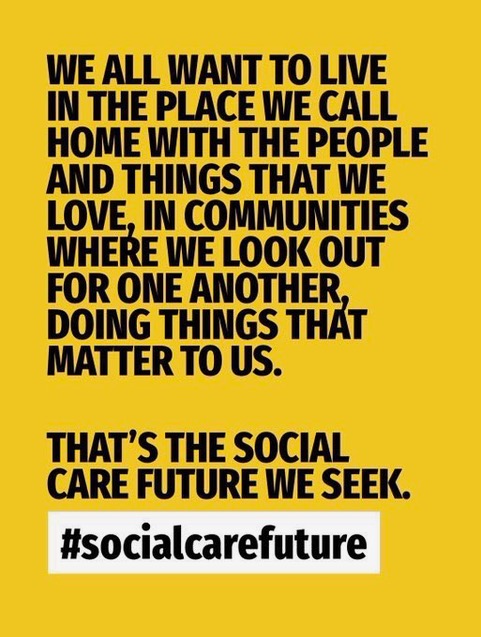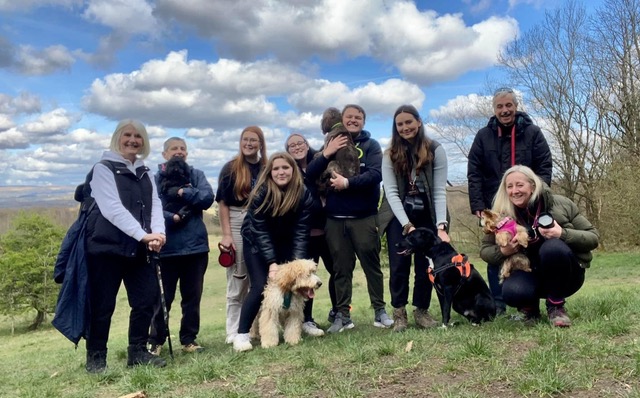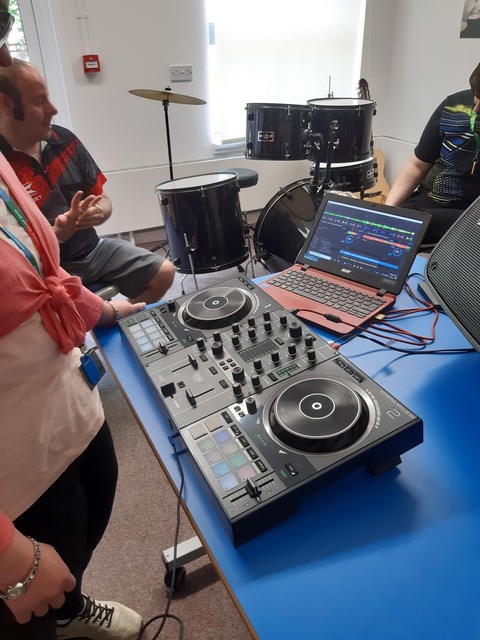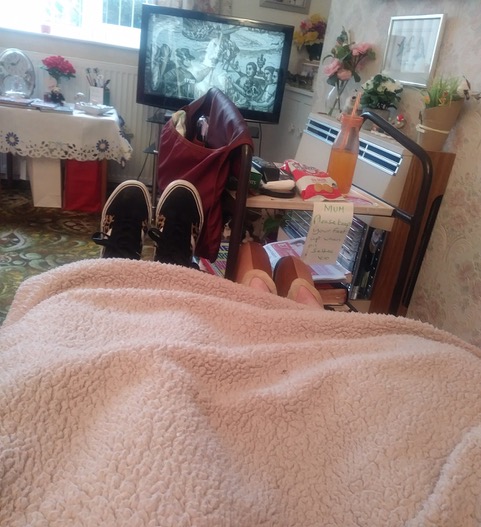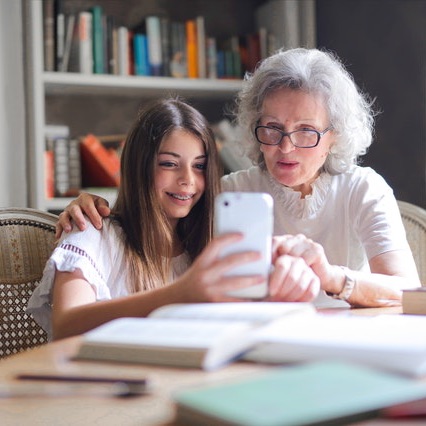My friend posted this on Twitter…
“Befriending scheme befrienders have to keep a log of every conversation you have. A true friend just listens and chats back when you talk to them”
My reply on Twitter was…
“Let’s help create opportunities for friendships to flourish rather than provide a service with restrictions”
I say ‘my friend’ posted this, that’s how I would describe her if I was introducing her to someone. We met online, firstly through a Social Care Future event and then followed each other on Twitter. During lockdown restrictions all of our work at Community Circles went online via our Facebook Group Circles Connected with the intention to support people to stay connected and stay involved with hobbies and interests. My friend joined the Facebook Group and over the last two years we have been in touch online via Facebook posts and Zoom. We’ve chatted often, about what we’ve been up to, sharing our own interests, finding common ground and learning new things. We’ve become friends on Facebook. Currently geography is a challenge but if I was ever visiting her home town or likewise she was visiting mine, I’d like to think we would meet in person for a coffee and spend time together. Isn’t this how friendships develop? The silver lining for me during lockdown restrictions is that I’ve been able to connect with people online who I might not have met in person and my life feels richer for that and I’d love the opportunity to meet in person.
Why is it within the world of social care we professionalise friendships? Is there an assumption that everyone who draws on social care is vulnerable and everyone else is untrustworthy? Bryony Shannon shares her thoughts about the use of the word vulnerable here.
I love nattering and the wide variety of conversations you can have with people; from putting the world to rights with the postman on an early dog walk, to chatting at the bar with someone because you’re both wearing a James t-shirt on the way to a gig or just a few minutes of company and conversation with someone on a train.
I give a bit of my time each week to chat to someone on the phone. Lockdown restrictions limited some opportunities for conversation and I missed that, so when I saw an organisation asking for volunteers to chat with people on the phone I signed up. This was to support a need in me that I was missing and also hoping that someone would enjoy chatting with me.
I could be labelled as a volunteer and it’s true I do give my time freely but the reason I spend my time chatting on the phone is because it supports my own wellbeing, I enjoy the conversation and connection. I sometimes struggle with the notion of ‘volunteering’ where there feels an imbalance of power between the volunteer and the recipient. The gift of time is one of the greatest things we can give but how can we share our time together so that relationships can be reciprocal, where we can walk alongside each other and recognise the contributions that we can all make?
I have been chatting with a couple of people for nearly two years, that’s a lot of conversation! I look forward to our chats, our relationship has deepened and we’ve become friends. Isn’t that how friendships happen; an introduction, a common interest, being at school together, working together, being a neighbour, being familiar in a place? This year I’ll be celebrating my 30th wedding anniversary because I married my best customer when I worked at Our Price Records.
I didn’t have to keep a log of my conversations but I was conscious of befriending boundaries and now my volunteer befriending role has come to an end. The organisation I was volunteering with has a policy that limits phone calls for 12 weeks. Joy has more fabulous travel stories than we could fit into 12 weeks of conversation and I want to hear more. Jim used to be a DJ and we chat a lot about music. Our conversations bring a richness to my life and I’m hoping to theirs. But I’m no longer a volunteer as I wouldn’t agree to the 12 week limit.
I’m now a friend. I’m still having weekly chats because our relationships feels reciprocal and we’re keen to carry on chatting. But I can’t do that with the permission and support of the organisation because it doesn’t fit with their policies and procedures, I’ve had to go rogue. I’m comfortable with my decision to continue the phone calls but others may not be, what are the opportunities lost when we put a time limit on our connections?
Our purpose at Community Circles is to create opportunities for people to come together and help each other have better and more connected lives. This matters to me within my work role and within my personal life, relationships are at the heart of our wellbeing. How can we get better at creating opportunities for friendships to flourish rather than professionalising friendships? Some of the ways we are trying this with Community Circles is through our Two Hour Club and Small Sparks.
Here are some thoughts that have come to mind as I continue with my phone calls
Overstepping professional boundaries?
At Community Circles part of the way we live our values and build authentic relationships is to bring our whole selves to work; being comfortable to be ourselves, sharing our interests and passions, having joy in our roles and being our true selves. When I think about relationships, I think about the 3P’s; the professional, personal and private*
Professional refers to our working roles, drawing on knowledge, theory and experience and informing how we work together and support people. Personal is the part of ourselves that we share to support the building of authentic relationships, reducing imbalances of power and connecting with others. The private self is the part of us that is only shared with those closest to us. What we share depends on the context, the relationship and the experience and is unique for each person. I want to choose my friends based on lots of different qualities and not forced into a ‘them and us’ scenario where I can’t develop friendships with people I have met in a professional capacity. Equally I want to be able to make introductions where there’s an opportunity to connect people around shared interests. I enjoyed hearing great conversations when I introduced my niece’s partner to Jim to chat about cricket, having both played for the same team. I have also been delighted this week as I begin to facilitate a Circle about the conversations that have taken place within a large organisation about a paid member of staff and her husband being part of the Circle. Rather than focussing on professional boundaries, the conversation has looked at relationships and choice and the current situation. The risk of maintaining professional boundaries and not bringing our whole selves to work is continuing to support the hierarchy and power imbalance between the professional and the person who draws on social care.
What about risk?
A life without risk is a life without opportunity. We all take risks in a variety of ways, from crossing the street to trying something new. When I started open water swimming I considered the risks, I did my research, I started going with close friends who were more experienced; I now swim every week, am a host for Mental health Swims and have made new friends with others who also love swimming. My life is richer because I took a risk to try something new. Why is this different for someone who draws on social care?
Community Circles creates opportunities for people to come together and have more connected lives. We don’t ignore any issues around risk; we create a space for listening well, for sharing ideas and exploring what matters to someone. Where there is an issue around risk, we have a conversation and use the person centred approach to risk which helps us to explore in detail about what matters to someone, gather clarity about the risk, share ideas, chat about what great support looks like and plan next steps. This process also helps us explore the opportunities lost and risks of doing nothing. You can find out more about the person centred approach to risk in this recording.
How can we get better at creating opportunities for friendships to flourish? Would love to hear your thoughts.
Cath Barton
* a Danish model developed by 10Rs1 Group 6 (2010, cited in Charfe and Gardner) which recognises the three areas of self when working alongside people – professional, personal and private. Charfe L., Gardner A.. Social pedagogy and social work. SAGE Publications. London: 2019

